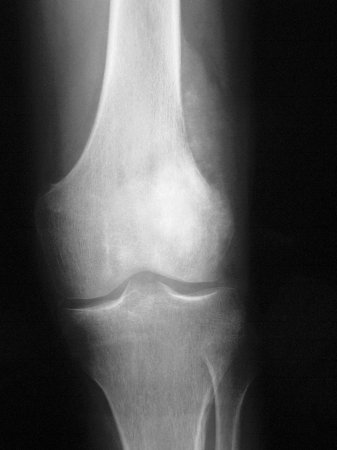Resumen
Definición
Anamnesis y examen
Principales factores de diagnóstico
- childhood and adolescence
- worsening pain over weeks to months
- mass/swelling
- male sex
Otros factores de diagnóstico
- race/ethnicity
- tall stature
- high birthweight
- limp
- history of trauma
- limited range of motion
Factores de riesgo
- childhood and adolescence
- Paget disease
- radiation therapy
- Rothmund-Thomson syndrome
- familial retinoblastoma syndrome
- Li-Fraumeni syndrome
- race/ethnicity
- nonfamilial deleterious germline variants
- male sex
- tall stature
- high birthweight
- chemotherapy exposure
Pruebas diagnósticas
Primeras pruebas diagnósticas para solicitar
- conventional radiographs
- bone biopsy
- MRI
- CT
- CT thorax
- bone scan
- whole body fluorodeoxyglucose (FDG)-PET/CT
- CBC
- serum alkaline phosphatase
- serum lactate dehydrogenase
Algoritmo de tratamiento
low-grade disease at presentation
high-grade nonmetastatic disease at presentation
metastatic disease at presentation
relapsed/refractory disease
Colaboradores
Autores
David Loeb, MD, PhD
Chief
Division of Pediatric Hematology, Oncology, and Marrow & Blood Cell Transplantation
Children's Hospital at Montefiore
Associate Professor, Pediatrics
Associate Professor, Developmental and Molecular Biology
Albert Einstein College of Medicine
Bronx
NY
Divulgaciones
DL declares that he has no competing interests.
Agradecimientos
Dr David Loeb would like to gratefully acknowledge Dr Luminita Rezeanu and Dr Michael J. Klein, the previous contributors to this topic.
Divulgaciones
LR and MJK declare that they have no competing interests.
Revisores por pares
Edward Sauter, MD, PhD
Professor of Surgery
Ellis Fischel Cancer Center
University of Missouri
Columbia
MO
Divulgaciones
ES declares that he has no competing interests.
Rachael Windsor, BSc, MBBS, MSc, MRCPCH
Locum Consultant Paediatric Oncologist
University College Hospital
London
UK
Disclosures
RW declares that she has no competing interests.
Peer reviewer acknowledgements
BMJ Best Practice topics are updated on a rolling basis in line with developments in evidence and guidance. The peer reviewers listed here have reviewed the content at least once during the history of the topic.
Disclosures
Peer reviewer affiliations and disclosures pertain to the time of the review.
References
Key articles
WHO Classification of Tumours Editorial Board. Soft tissue and bone tumours: WHO classification of tumours. 5th ed. vol 3. Lyon, France: IARD Press; 2020
National Comprehensive Cancer Network. NCCN clinical practice guidelines in oncology: bone cancer [internet publication].Full text
Strauss SJ, Frezza AM, Abecassis N, et al. Bone sarcomas: ESMO-EURACAN-GENTURIS-ERN PaedCan Clinical Practice Guideline for diagnosis, treatment and follow-up. Ann Oncol. 2021 Dec;32(12):1520-36.Full text Abstract
Reference articles
A full list of sources referenced in this topic is available to users with access to all of BMJ Best Practice.

Differentials
- Ewing sarcoma
- Chondrosarcoma
- Malignant fibrous histiocytoma
More DifferentialsGuidelines
- NCCN clinical practice guidelines in oncology: bone cancer
- ACR appropriateness criteria: suspected primary bone tumors
More GuidelinesLog in or subscribe to access all of BMJ Best Practice
Use of this content is subject to our disclaimer